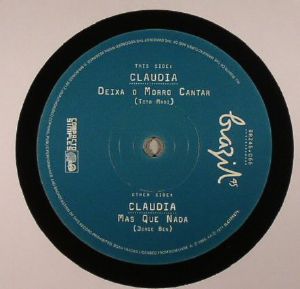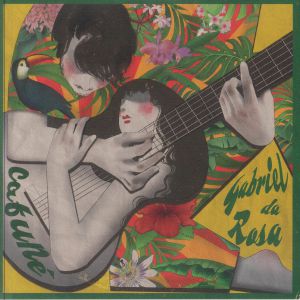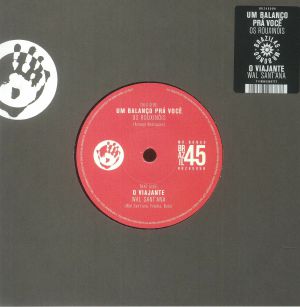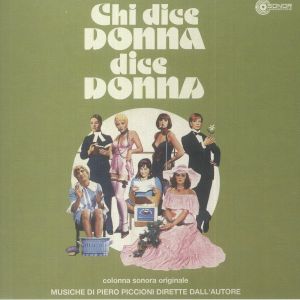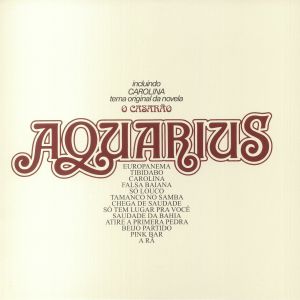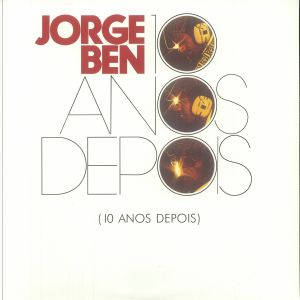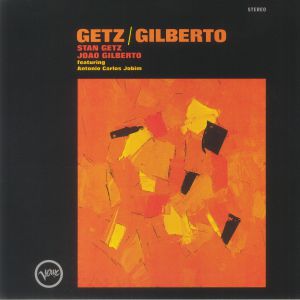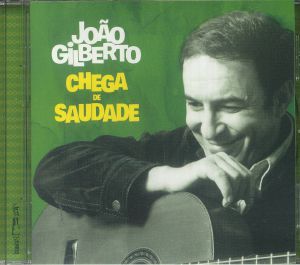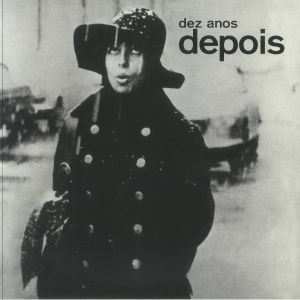Filter
Stock
Artist
Featured
Release Title
Price
Back catalogue: International
Juno's full catalogue of International
Singles
Dois Minutos De Um Novo Dia (limited 7")
Cat: BRZ45 048. Rel: 01 Jul 16
Gespielt von: Afro Beat Foundation, I Love 45's!
in stock ₺494,87
Eu Bebo Sim (limited 7'')
Cat: BRZ 45 025. Rel: 01 Jun 15
Review: Brazil 45s hit the quarter century in their run and show no sign of stopping. It's an all-girl affair on this one as two hugely popular and prolific singers take a spin under Mr Bongo's spotlight. Elizabeth (often known as Elizete) lays down a steamy samba flavour that gets raunchier as the track develops. Elza, meanwhile, gets busy on a Bossa tip as a carnival of percussion and horns go toe-to-toe with her sharp, sexy staccato vocals. Powerful.
… Read more in stock ₺494,87
Review: Supreme musica popular Brasileira and bossa-nova vibes here on two tracks from Mr Bongo's leading Brazilian 45's lady, Claudia. "Deixa o Morro Cantar" features on Claudia's very first 7", released in 1965 by RGE Brazil. Her version of "Mas Que Nada" is said to be more of a jazzy/folk-funk take on the Ben classic. A relatively recent discovery made during the label's last trip to Brazil, Maria das Gracas Rallo was born in 1946 in Rio de Janeiro. She has become the most awarded singer outside of her home country and was most popular internationally in 1982 with the song "Don't Cry for Me Argentina" from the musical Evita. Moreover, she has recorded over twenty albums and has amassed huge record sales throughout her successful career.
… Read moreGespielt von: Mukatsuku Records Chart, I Love 45's!
in stock ₺461,64
in stock ₺505,42
Review: After his debut album E o que a casa oferece from 2023, Gabriel da Rosa is back with another silken bossa nova record, in homage to the musical style that raised him. 'Cafune' was first released digitally a follow-up single to the alnbum, one which rounded out the year that said debut was released, and which was written for the soundtrack to the film film All Happy Families (Haroula Rose). Now an authentic 12" version, the song is here backed by the B-side 'Sort Of', an impressive desert passage through refractive, rainbow dream pop.
… Read more in stock ₺703,27
Review: Two outstanding Brazilian funk cuts straight out of 1971: "Esperar Pra Ver" is a laden with an immense orchestrated groove that's triggered by a lean, unforgettable bass guitar riff that matches Evinha's purring, slinky allure. "Que Bandeira" rolls with more of a poppy bossa flow with militant rim shots, swooning strings and a momentum that builds on every verse. Both tracks are taken from Cartao Postal, Evinha's third album that has been known to pass hands for as much as L500 in the past.
… Read more in stock ₺483,27
Review: Two powerful bossa nova workouts from 1972: Brazilian chanteuse Rose Maria delivered two incredible funk jams on Tapecar which escaped her prolific album releases and never enjoyed a repress. Until now... The Afro-Latin soul of "Deixa Nao Deixa" is all about the sudden dynamic from purring verses to emphatic, harmonic chorus while "Avenida Atlantica" takes a more straight-up funk route with its dominant horns and heavy boss break. Instant party material.
… Read more in stock ₺461,64
Figa De Guine (7")
Cat: BRZ 45058. Rel: 15 Dec 16
Gespielt von: Mukatsuku Records Chart
in stock ₺483,27
Se Voce Quiser Mas Sem Bronquear (limited 7")
Cat: BRZ45 09. Rel: 08 Jan 25
Review: Mr Bongo's Brazilian 45 series hits it's ninth gear with two region-defining slices of sun-kissed samba soul. Doris takes the lead with delicate frontage. Leading from the front, all instruments follow her cues and mirror each vocal flourish with mild big band cheekiness. The instantly distinctive "Tudo Que Voce Podia Ser" from sister quartet Quarteto Em Cy is a great twist on a Latin classic with its slightly rocky guitars and full bodied harmonies. Previously released in 1972, a return has been long overdue.
… Read more in stock ₺494,87
Review: It was the iconic Copacabana Records that put out this classic MPB back in 1964. That makes 'Um Balanco pra voce' by Os Rouxinois one of the oldest releases in Mr Bongo's Brazil45 series and it is also one of the best. Arnaud Rodrigues wrote the tune which is a superb mix of exotic funk, bossa nova rhythms and quirky melodies from a five-track 7" of tunes that the band originally used to play on TV. On the other side, 'O Viajante' is the sort of irresistibly sunny sound that quickly wins your heart and is sure to light up any dancefloor.
… Read more in stock ₺494,87
Chi Dice Donna Dice Donna (remastered) (limited 7")
Cat: SONOR 22. Rel: 08 Feb 23
Gespielt von: Voodoocuts
in stock ₺1.110,03
Nem Vem Que Nao Tem (remastered) (reissue) (limited 7")
Cat: BRZ 45020R. Rel: 29 Aug 24
Review: A dynamic duo of Brazilian classics on 7" from Wilson Simonal and Trio Mocoto. On Side-1. you have the infectious samba-MPB hit 'Nem Vem Que Nao Tem' by Wilson Simonal, a standout from his 1967 Alegria, Alegria !!! album. This track gained renewed fame in 2002 when it was featured in the critically acclaimed film City of God, exciting new audiences with its lively rhythms. On the flip side, Trio Mocoto delivers the orchestral-infused gem 'Nao Adianta,' first appearing on their self-titled 1977 Arlequim LP. Known for their collaboration with Jorge Ben on seminal albums like 'Forca Bruta,' this group was instrumental in developing the samba rock sound, blending samba, soul, and rock with an unmistakable sun-kissed flavor. This release is a vibrant celebration of Brazil's rich musical heritage, capturing the essence of two legendary acts in one compelling package.
… Read moreGespielt von: Voodoocuts, Juno Recommends International
in stock ₺428,92
Lovely Day (reissue) (limited 7" in spot-varnished sleeve)
Cat: MRB 7222NB. Rel: 05 Jul 24
Review: The bossa nova remake of Bill Withers' classic 'Lovely Day' by Studio Rio is a masterful mood lifter. Reissued by Mr Bongo, this track was a game-changer at the Shapes festival, transforming a snowy Alpine setting into a feel-good dancefloor. Originating from Studio Rio's 2014 release The Brazil Connection, the Grammy-winning Berman Brothers collaborated with Brazilian legends like Marcos Valle and Roberto Menescal. They used original multitracks to seamlessly blend Withers' soulful vocals with bossa nova rhythms. Joyful horns, a bouncing double bass, and Pretinho da Serrinha's cavaquinho playing create an end-of-night anthem that radiates warmth and positivity.
… Read moreGespielt von: Mukatsuku Records Chart, Manu Archeo, Pete Haigh, Juno Recommends Funk, Juno Recommends Soul
in stock ₺703,27
Alben
Gespielt von: Craig Charles Funk And Soul, Juno Recommends Jazz
in stock ₺1.088,40
La Rana (reissue) (LP + insert)
Cat: FARO 227LP RE. Rel: 11 Dec 24
Review: Agustin Pereyra Lucena's 1980 album La Rana was recorded in Oslo and is a wonderful exhibition of his exceptional guitar interpretations of compositions by Ivan Lins, Antonio Carlos Jobim and his friend Baden Powell, all alongside his own original works including the 15-minute masterpiece 'Encuentro De Sombras.' Featuring bassist Guillermo Reuter, flautist Ruben Izarrualde and drummer Finn Sletten, La Rana blends South American rhythms with Norwegian landscapes and reflects Agustin's warmth, humility, and joyful connection to music and life and the title track is a standout that offers a unique rendition of Joao Donato's 'A Ra' from his 1973 album Quem E Quem.
… Read moreGespielt von: Craig Charles Funk And Soul
in stock ₺1.142,74
in stock ₺626,77
Review: This collaboration between Nelson Angelo and Joyce on Nelson Angelo e Joyce brings a radiant blend of Brazilian folk and jazz-inflected arrangements, where lush acoustic guitars meet cool, swirling percussion. The pair's harmonies are effortlessly seamless, carrying a sense of intimacy and warmth throughout. While the sound may occasionally veer into serene, almost pastoral territory, there's an undercurrent of depth, especially in the more syncopated rhythms and spontaneous melodic shifts.
… Read more in stock ₺802,45
in stock ₺1.098,96
Rovanio (limited hand-numbered gatefold 180 gram audiophile blue vinyl LP + insert in autographed sleeve)
Cat: IOT 771521. Rel: 22 Jun 23
in stock ₺989,22
Review: Tropical is Brazilian samba legend Jorge Ben Jor's fifteenth album and it blends unreleased tracks with reimagined covers like 'Taj Mahal' and 'Pais Tropical.' This superb mix of tunes embraces more pop and Western influences than before and hints at his later shift toward the World-Dance sound of the 1980s. Originally aimed at international markets, the album wasn't released in Brazil until 1977 but ably showcased Ben Jor's immense talent as he skilfully revitalises familiar tunes with fresh arrangements that capture the spirit of the times. This era-defining record from Brazil is yet another must-have.
… Read moreGespielt von: Juno Recommends International
in stock ₺824,61
Samba Esquema Novo (reissue) (clear vinyl LP limited to 300 copies)
Cat: SOW 026. Rel: 17 Jun 22
Review: There is a near endless supply of music from Brazilian samba king Jorge Ben. He was a rule breaker back in his day and someone who challenged the conventions of the sound. His albums are in constant high demand and always getting reissued. This one, Samba Esquema Novo, is one of the best and not least because it is opened up by the legendary 'Mas, Que Nada' which will immediately bring sunshine to any setting. The other tunes are just as vibrant with his elastic vocals, delicate guitar work and generally good time vibes.
… Read moreGespielt von: Juno Recommends International
in stock ₺813,53
Review: As you can probably work out from the title, this one is the tenth album from Brazil's samba king and genre game-changer Jorge Ben (it makes a change from him calling most of his albums 'Ben' to be honest.) It came first back in 1973 and features a collection of his then-most popular songs. All of them come from the first decade of his career but were all rerecorded as medleys. They bring with them sunny melodies and his signature stuffing grooves, acerbic and witty lyrics and easy to get lost in rhythms.
… Read more in stock ₺802,45
in stock ₺835,16
Cancao Do Amor Demais (reissue) (limited 180 gram vinyl LP)
Cat: 709116. Rel: 17 Jun 24
Gespielt von: Juno Recommends International
in stock ₺736,51
in stock ₺890,56
Review: Some 20 years on from the acclaimed Nicola Conte presents Rosalia De Souza album Garota Moderna, it now gets a full reissue across double vinyl on Schema out of Italy. It is a high class debut record that has more than stood the test of time and has always been of great interest to fans of artists like Patricia Marx and Bebel Gilberto. The singer's sunny vocals soar over the lush Brazilian rhythms with samba, bossa, broken beat and new jazz all thrown down and blended together. Instrumentals are rich and authentic and take you to a beach, sipping a cocktail under a beaming sun.
… Read more in stock ₺1.571,67
in stock ₺1.220,30
Gespielt von: Ex-Friendly (Truth & Lies Music), Juno Recommends International
in stock ₺1.098,96
Quem E Quem (reissue) (180 gram green vinyl LP)
Cat: 333081 LTD. Rel: 06 May 25
Review: Quem E Quem is widely regarded as Joao Donato's finest work and a standout in the canon of Brazilian popular music, aka MPB. Blending American soul and jazz-funk influences with the gentle sway of samba and bossa nova, the album radiates warmth and subtle sophistication and Donato's tender vocals are framed by breezy flute passages, laid-back piano lines and guitar solos reminiscent of Pat Metheny. The result is a beautifully balanced collection of upbeat tracks and introspective moments with each evoking the tranquil pleasure of a sunset in a tropical paradise. Timeless and effortlessly charming, it remains a high point in Donato's enduring career.
… Read more in stock ₺1.901,41
Review: By the time he recorded "Brazilian Dorian Dream" in 1976, Brazilian composer, musician, producer and bandleader Manfedo Fest had already worked on countless bossa-nova, samba and jazz albums, both in the United States and his native Brazil. Yet the album, which Far Out has now reissued, is like nothing else he recorded before or after - and not just because it was based on "the principle of the modal diatonic scales of the Dorian mode". Musically, it's deliciously vibrant and colourful, combining elements of his native Brazilian samba and bossa-nova with Azymuth style jazz-funk, American jazz-fusion, and futuristic, then cutting edge synthesizer sounds. Above all, though, the album strikes a near perfect balance between funkiness and the sweet sunniness that defines some of the greatest Brazilian music.
… Read more in stock ₺967,06
Getz/Gilberto (heavyweight vinyl LP)
Cat: 535515 6. Rel: 16 Oct 14
Gespielt von: Juno Recommends Jazz, Miles Away Recs
in stock ₺1.220,30
in stock ₺824,61
Gespielt von: Juno Recommends Jazz
in stock ₺736,51
in stock ₺681,64
Joao Gilberto (reissue) (clear vinyl LP limited to 300 copies)
Cat: SOW 011. Rel: 15 Mar 22
Gespielt von: Juno Recommends International
in stock ₺780,30
Gespielt von: Juno Recommends International
in stock ₺912,19
in stock ₺472,71
Chega De Saudade (reissue) (180 gram audiophile vinyl LP)
Cat: 291010. Rel: 08 Aug 24
Gespielt von: Juno Recommends International
in stock ₺714,35
Samba Is Our Gift (Record Store Day RSD 2024) (limited green vinyl LP + insert)
Cat: FARO 106LPX. Rel: 26 Apr 24
Review: Far Out Recordings launches its 30th anniversary celebrations with the highly anticipated release of The Ipanemas's Samba is Our Gift which lands on vinyl for the very first time. Originally dropped in 2006, the album seamlessly blends Afro-Brazilian-bossa rhythms with classic vocal samba, transporting listeners back to the vibrant Rio de Janeiro of the 1960s. Comprising drummer and vocalist Wilson Das Neves and guitarist Neco, The Ipanemas played a pivotal role in popularising bossa nova in the 1950s. Collaborating with Brazilian luminaries like Elis Regina and Antonio Carlos Jobim, they bridged jet-set bossa with the roots-y samba of the black Brazilian working class and this is a great introduction to their work if you aren't familiar.
… Read moreGespielt von: Charlie bucket/ dancing in space
in stock ₺1.286,25
The Composer Of Desafinado Plays (reissue) (limited hand-numbered 180 gram 'lagoon' black & green splattered vinyl LP)
Cat: SRPD 0022LG. Rel: 24 Sep 24
in stock ₺1.209,22
in stock ₺736,51
in stock ₺736,51
Review: Passarinho Urbano (Urban Bird) is the album-length result of a chance encounter between singer and musician Joyce Moreno and producer Sergio Bardotti in Rome, Italy. Thoroughly relaxed and recharged after a long break in the city, Moreno's rejuvenated state of mind lent immediately to a spur-of-the-moment reimagining of some of her favourite classical Brazilian MPB and bossa nova standards, some of whose original composers were leading lights of the underground cultural resistance during the country's military dictatorship by the Brazilian Army during the 1960s. With a soft-spoken, intimate vocal intonation by Moreno, and a composition centring on slow-building, rhythmically deft call-and-response cantos, this album deserves its longstanding status as a secret masterpiece, a status which'll surely be renewed once more by this first-time-worldwide reissue by Week-End Records.
… Read more in stock ₺1.571,67
Dez Anos Depois (reissue) (gatefold 180 gram audiophile vinyl 2xLP)
Cat: MOVLP 3817. Rel: 04 Feb 25
Review: Nara Leao takes a reflective journey through her musical career with this stunning double album, originally released in 1971. Recorded in both Paris and Rio de Janeiro, it's an intimate collection of reinterpreted classics, showcasing Leao's gentle yet emotionally powerful vocals. The album features timeless tracks like 'Chega de Saudade', 'O Barquinho', and 'Corcovado', each stripped back to its essence with minimalist acoustic arrangements. Leao's voice shines throughout, capturing the nuances of these beloved songs with a delicate touch and heartfelt sincerity. The involvement of guitarist Tuca, known for her work with Francoise Hardy, adds another layer of depth to the recordings, her playing complementing Leao's vocals with sensitivity and grace.
… Read moreGespielt von: Juno Recommends Jazz
in stock ₺1.637,62
in stock ₺736,51
in stock ₺813,53
A Bossa Nova De Roberto Menescal (reissue) (limited 180 gram vinyl LP)
Cat: 709119. Rel: 13 Sep 24
Review: Presented here is Brazilian guitarist and composer Roberto Menescal's classic LP A Bossa Nova de Roberto Menescal featuring additional tracks from the same period, all with the legendary Eumir Deodato on piano. Born on October 25, 1937, Menescal is a pioneer of bossa nova and is best known for his iconic song 'O Barquinho' (Little Boat). He has collaborated with Latin music legends like Carlos Lyra, Nara Leao, Wanda Sa, and Ale Vanzella and was nominated for a Latin Grammy in 2002 and received the Latin Recording Academy Special Award in 2013 for his contributions to the genre.This one is a great insight into his sound and what makes him so special.
… Read more in stock ₺736,51
in stock ₺846,24
Infinito Particular (remastered) (limited LP + insert)
Cat: 334811. Rel: 05 Sep 24
Gespielt von: Juno Recommends International
in stock ₺1.736,80
Cat: BBE 719CCD. Rel: 18 Jan 24
Review: You might know Airto Moreira and Flora Purim as the King and Queen of Brazilian Jazz and for good reason. They have spent more than the last half decade putting out some of their homeland's finest and most richly rewarding jazz albums as well as playing exhilarating live shows all over the world. They have found favour with jazz lovers everywhere as a result, from Japan's concert halls to the UK's jazz-funk scenes. If You Will was their last album back in 2022 and it got a Grammy, and now A Celebration: 60 Years - Sounds, Dreams & Other Stories brings together some of their best work from over the last 60 odd years. Essential stuff.
… Read moreGespielt von: AfroBase (Radio Chart), Pete Haigh
in stock ₺1.516,80

 TRY
TRY








